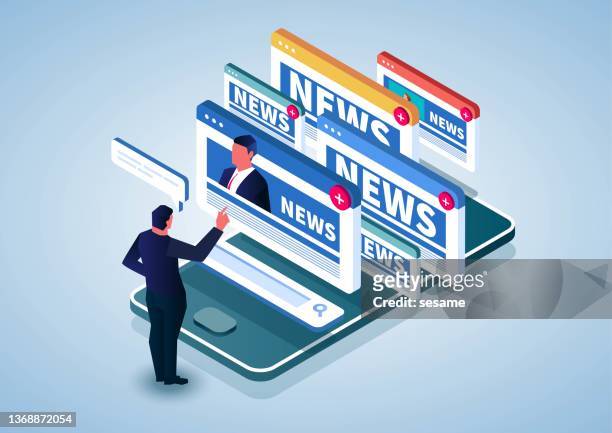Unpacking the Latest Trends in stnews.live Stories
The Importance of Fact-Checking on the planet of News Online
The prevalence of misinformation in today's on the internet news landscape has actually gotten to worrying degrees. Fact-checking organizations play an essential duty in combating this fad. They confirm cases and enhance the credibility of journalism. The performance of these organizations typically hinges on their approaches and public understanding. As target markets browse this complicated setting, the effects of their findings may form the future of news usage and trust. What does this mean for the integrity of information moving on?

The Increase of False Information in the Digital Age
Just how has the introduction of electronic innovation added to the spread of misinformation? The quick growth of the web and social media platforms has facilitated the circulation of details at an unprecedented rate. Users can share articles, videos, and point of views with a mere click, commonly without confirming the material's accuracy. Formulas focus on spectacular or emotionally billed product, resulting in a spreading of misleading stories that record interest.
In addition, the anonymity paid for by electronic systems allows people to spread incorrect details without responsibility (stnews.live). Misinformation grows in echo chambers, where customers are exposed largely to point of views that reinforce their beliefs, better entrenching frauds. The saturation of info can overwhelm customers, making it testing to recognize reliable sources from unreliable ones. Misinformation has actually become a prevalent issue in the electronic landscape, affecting public opinion and depend on in reputable news sources.
The Duty of Fact-Checking Organizations
Fact-checking organizations play a crucial function in improving the reputation of journalism by verifying cases made in news records. Their efforts are vital in combating misinformation, ensuring that precise info prevails in the digital landscape. By holding media electrical outlets liable, these companies add considerably to educated public discussion.
Enhancing Reputation in Journalism
While false information multiplies in the digital age, fact-checking organizations play an essential duty in improving the credibility of journalism. These companies diligently verify cases made in newspaper article, public declarations, and social networks blog posts, making certain that information shared to the general public is exact and reliable. By giving independent evaluations, they serve as an important source for journalists, aiding them preserve high requirements of stability. On top of that, their efforts advertise transparency in media, fostering public trust. As audiences become increasingly critical, the existence of respectable fact-checking entities can differentiate dependable news sources from those that may spread frauds. Ultimately, the commitment of fact-checking companies to maintain truthfulness is essential for the health and wellness of autonomous discussion.
Combating False Information Properly
As false information continues to spread out rapidly throughout digital systems, the duty of fact-checking companies ends up being significantly crucial in the battle for exact details. These companies work as watchdogs, scrutinizing claims made by public figures and media electrical outlets to guarantee liability. By utilizing rigorous study approaches and specialist evaluation, they validate realities and clear up deceptive narratives. Their findings are disseminated via different networks, informing the general public and fostering essential reasoning. Additionally, collaborations with social networks systems enhance their reach, permitting for prompt flagging of false info. As electronic literacy expands, the influence of fact-checking organizations is vital in empowering target markets to discern truth from fallacy, inevitably adding to a much more educated society.
Exactly How False Information Affects Public Perception
False information substantially undermines trust in media, leading audiences to wonder about the integrity of news resources. Consequently, individuals commonly move in the direction of electrical outlets that enhance their present beliefs, adding to the polarization of viewpoints. This vibrant produces a fragmented details landscape, where shared recognizing ends up being progressively challenging to accomplish.
Trust fund in Media

Count on in media has actually ended up being progressively delicate in the electronic age, where the quick spread of false information can skew public perception. As false information multiplies across social media sites and on-line systems, audiences usually locate it testing to determine credible sources from unreliable ones. This uncertainty cultivates suspicion, leading lots of individuals to examine the intentions behind news reporting. As a result, trust fund in developed media outlets has diminished, as consumers significantly transform to different sources that may lack strenuous editorial criteria. This disintegration of trust not only influences specific beliefs but also weakens the cumulative ability to engage in educated conversations. Inevitably, the stability of journalism goes to risk, highlighting the vital requirement for reliable fact-checking to restore self-confidence in the media landscape.

Polarization of Point of views
The increasing apprehension towards traditional media has actually added to an expanding polarization of viewpoints amongst the public. False information, often shared via social media sites and on-line systems, plays a substantial duty fit distinct ideological separates. People frequently seek information that aligns with their pre-existing ideas, you could check here reinforcing their viewpoints while dismissing opposing point of views. This echo chamber impact intensifies divisions, bring about a fragmented public discourse where agreement becomes progressively elusive. Additionally, sensationalized stories grow in this setting, even more skewing public assumption and promoting question in credible sources. As polarization rises, the need for efficient fact-checking comes to be paramount to connect gaps and advertise notified conversations, eventually guaranteeing an extra natural culture efficient in maneuvering complex issues.
Methods for Efficient Fact-Checking
Efficient fact-checking depends on a methodical strategy that includes detailed research study, confirmation of resources, and critical analysis of cases. A foundational strategy is cross-referencing info from numerous reputable resources to verify its accuracy. Fact-checkers typically make use of specialized databases and archives to map the beginning of specific statements, making sure that the reported information lines up with recorded proof.
An additional important method involves inspecting the context in which cases are offered. Misleading info can arise from out-of-context quotations or discerning data usage. By taking a look at the broader story, fact-checkers can recognize potential prejudices or misconceptions.
Moreover, engaging with professionals in relevant areas can supply quality and understanding that boosts the fact-checking procedure. This collaboration can discover subtleties that laypeople might neglect - stnews.live. Inevitably, a self-displined strategy integrating these techniques cultivates a more enlightened public, boosting the integrity of info shared in the digital age
The Influence of Social Network on News Consumption
Just how has social media transformed the way individuals consume news? The emergence of systems like Facebook, Twitter, and Instagram has especially transformed news consumption patterns. News is now disseminated rapidly, enabling customers to accessibility real-time updates and involve with material with sort, shares, and remarks. This immediacy has cultivated a preference for bite-sized details, frequently at the cost of comprehensive analysis.
Furthermore, social media sites allows customized news feeds, where formulas curate material based upon individual preferences, producing echo chambers that may restrict direct exposure to diverse viewpoints. The duty of typical news outlets has actually lessened as people significantly count on peer referrals and trending subjects. Consequently, the reputation of info is commonly jeopardized, as sensationalism can outweigh factual coverage. On the whole, social media sites has reshaped news usage, emphasizing speed and customization while challenging the standards of journalistic honesty.
Empowering Target Markets to Determine Trustworthy Resources

Furthermore, analyzing the authorship and business background of newspaper article can disclose potential predispositions. Cross-referencing information across multiple trustworthy outlets additionally enhances the verification procedure. Making use of digital devices, such as web browser extensions that rate the credibility of sites, can additionally help in recognizing trustworthy details. By actively engaging with these sources and cultivating a crucial mindset, audiences can much better equip themselves to discern trusted news resources, eventually promoting an extra informed culture amidst the intricacies of today's media setting.
The Future of Journalism and Fact-Checking
As the media landscape progresses, the future of journalism and fact-checking deals with both challenges and opportunities. The rise of digital systems has actually democratized info circulation, allowing varied voices to emerge. This has actually additionally led to the expansion of misinformation, requiring durable fact-checking systems. Reporters will progressively depend on innovation, consisting of AI tools, to validate facts quickly and efficiently.
Cooperation between news organizations and fact-checking entities is prepared for to strengthen reputation and openness. Audience engagement will look at this now certainly play a vital role, as informed readers come to be considerable companions in identifying credible material.
The need for liability and precision is likely to grow, pressing reporters to promote high criteria in their coverage. Inevitably, the future of journalism might pivot on its capability to adjust to technological innovations while keeping journalistic integrity, making sure that fact-checking stays a keystone of reputable news.
Regularly Asked Inquiries
Just How Can I Report False Information I Experience Online?
To report misinformation come across online, people can make use of platform-specific reporting tools, provide clear proof, and share the details with fact-checking organizations. Involving with neighborhood discussions can also assist increase understanding about the misinformation.
What Prevail Signs of Misinformation in News Articles?
Typical signs of false information in news articles consist of spectacular headings, absence of reliable sources, emotional language, inconsistent facts, and lack of author credentials. Visitors should critically review material for these indications to go discern accuracy.
How Do Fact-Checkers Confirm Resources?
Fact-checkers verify resources by cross-referencing details with qualified data sources, speaking with specialists, and checking out the original context of insurance claims. They likewise examine the integrity of the resources, making sure accurate and credible information for public usage.
What Lawsuits Can Be Taken Against False information?
Lawful actions versus false information might consist of disparagement suits, cease-and-desist orders, and regulative charges. Targets can prosecute with civil courts, while some jurisdictions impose fines or permissions on systems sharing false info.
Are There Apps for Fact-Checking News On-The-Go?
Numerous applications exist for fact-checking news on-the-go, consisting of Snopes, FactCheck.org, and PolitiFact. These applications assist users verify claims quickly, promoting informed decision-making and cultivating a more discerning method to consuming news in real-time.